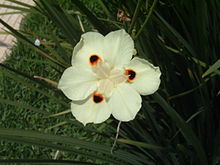- Dietes bicolor
-
Dietes bicolor 
Scientific classification Kingdom: Plantae (unranked): Angiosperms (unranked): Monocots Order: Asparagales Family: Iridaceae Subfamily: Iridoideae Tribe: Irideae Genus: Dietes Species: D. bicolor Binomial name Dietes bicolor Dietes bicolor (variably known as African iris or Fortnight lily) is a clump-forming rhizomatous perennial plant with long sword-like pale-green leaves, growing from multiple fans at the base of the clump. This species belongs to the Iridaceae (Iris) family. It can form large clumps if left undisturbed for years. This species is common in horticulture in its native South Africa, where it is often used in public gardens, beautification of commercial premises and along roadsides.
The blooms are yellow with three dark purple spots[1], each surrounded by an orange outline, and are followed by a capsule that may bend the flower stalks to the ground. Ripe seeds (dark brown in colour) are dispersed when the capsule dries and splits.
The leaves of Dietes bicolor are narrower than those of Dietes grandiflora and Dietes iridioides, and tend to arch more.
Cultivation
Plants prefer dappled-shade to full sun where they will flower in profusion, though they will grow in shaded areas (with an accompanying loss of flower production). This species as well as Dietes grandiflora are very drought tolerant.
Notes
- 1. ^ The spots on the flowers sometimes appear so dark as to seem black.
References
- Christman, Steve (2002-06-30). "Dietes iridioides". http://www.floridata.com/ref/D/diet_iri.cfm. Retrieved 2008-12-03.

This Iridaceae article is a stub. You can help Wikipedia by expanding it.
